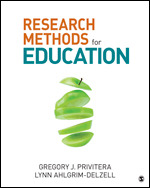Research Methods for Education
- Gregory J. Privitera - St. Bonaventure University
- Lynn Ahlgrim-Delzell - The University of North Carolina at Charlotte
Educational Research Methods
With a conversational, student-friendly writing style, and examples from a wide variety of education-related fields, the authors show how methods and statistics work together and enable the testing of hypotheses through use of the scientific method. Students will become informed consumers of research with the ability to understand a research article, judge its quality and apply the methods in action research to inform educational practice.
Give your students the SAGE edge!
SAGE edge offers a robust online environment featuring an impressive array of free tools and resources for review, study, and further exploration, keeping both instructors and students on the cutting edge of teaching and learning.
Available with Perusall—an eBook that makes it easier to prepare for class!
Perusall is an award-winning eBook platform featuring social annotation tools that allow students and instructors to collaboratively mark up and discuss their SAGE textbook. Backed by research and supported by technological innovations developed at Harvard University, this process of learning through collaborative annotation keeps your students engaged and makes teaching easier and more effective. Learn more.
Supplements
SAGE edge for Students provides a personalized approach to help students accomplish their coursework goals in an easy-to-use learning environment.
- Mobile-friendly eFlashcards strengthen understanding of key terms and concepts.
- Mobile-friendly practice quizzes allow for independent assessment by students of their mastery of course material.
- Learning objectives reinforce the most important material.
- EXCLUSIVE! Access to full-text SAGE journal articles that have been carefully selected to support and expand on the concepts presented in each chapter is included.
SAGE edge for Instructors, supports your teaching by making it easy to integrate quality content and create a rich learning environment for students.
- Test banks provide a diverse range of pre-written options as well as the opportunity to edit any question and/or insert your own personalized questions to effectively assess students’ progress and understanding.
- Sample course syllabi for semester and quarter courses provide suggested models for structuring your courses.
- Editable, chapter-specific PowerPoint® slides offer complete flexibility for creating a multimedia presentation for your course.
- EXCLUSIVE! Access to full-text SAGE journal articles that have been carefully selected to support and expand on the concepts presented in each chapter is included.
- An Instructor's Manual provides chapter outlines, learning objectives, and lecture suggestions in support of the learning objectives to help you prepare to teach the course.
- An Answer Key provides answers to all of the review questions in the textbook.
“A great text to highlight the applied nature of research methods in education.”
“Outstanding, clear, easy to read, and user-friendly for students. The activities and review questions provide very good reinforcement of the content. Students will love this text and it will make the course fun to teach.”
“This text is very readable and accessible to nearly every student, and filled with clear, direct explanations of all the basic terminology of educational research. It also provides excellent examples to illustrate the application of the contents of the course to actual research situations in education.”
“The book is highly understandable with clear definitions and examples of concepts and how to conduct components of various types of educational research. The pedagogical features allow students to learn the materials in an effective manner. [It is] a very user-friendly text for students who might be intimidated by having to take a research course.”
“The text is very well organized and conveys information in an easily understandable manner with examples that are related to experiences that students can identify with.”
“…thorough and easy to understand, I think students will respond well to this text.”
“[This] book is excellent for educational research. The simplicity with which the book is written is phenomenal and it makes the book easy to read and understand. It will appeal to instructors, students and individuals interested in educational research. The features and activities in the book will definitely improve student learning engagement.”
“Research Methods for Education is an excellent textbook that covers information on educational research design including qualitative, quantitative, and action research in education. It provides great information which is easy to understand for students to learn and instructors to teach. The text is writing in a non-technical way for better comprehension and understanding by students. The authors present great Learning Checks for students to complete self-checks of the understanding of materials as well as good review questions and learning activities.”
“[This text is] the most detailed and the well-organized textbook for the research study especially for the beginners.”
“[Privitera and Ahlgrim-Delzell’s] text is highly useful, accessible, and thorough in its descriptions of research procedures. The project-based approach makes it practical for classroom use while retaining its scholastic legitimacy.”
Sample Materials & Chapters
Chapter 7 Choosing a Research Design
Chapter 13 Quasi-Experimental and Single-Case Designs

